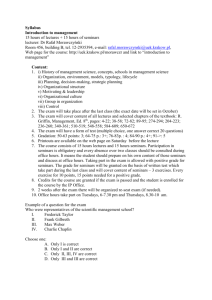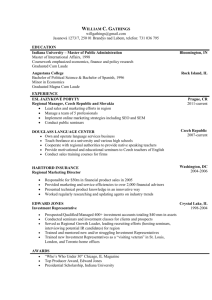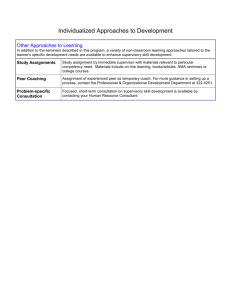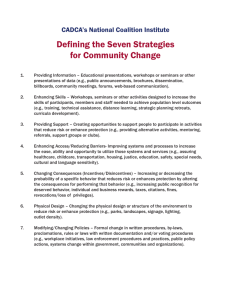1999 Real Estate Tax Update
advertisement
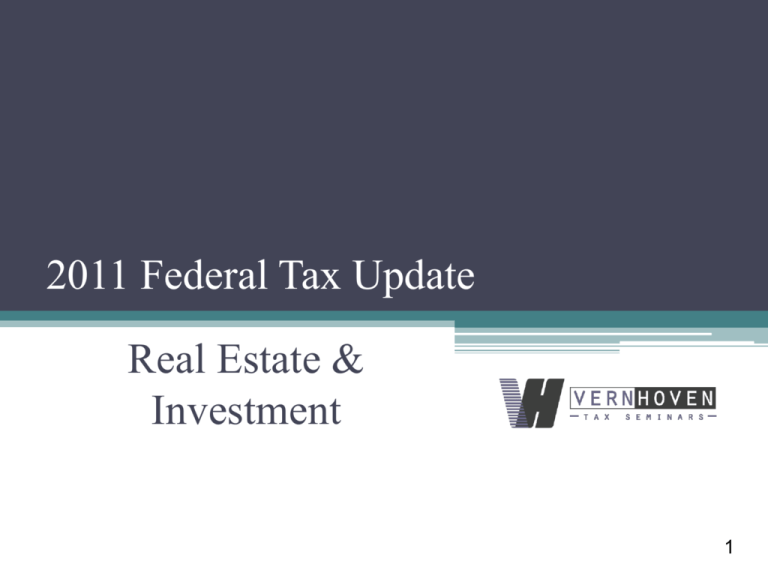
2011 Federal Tax Update Real Estate & Investment 1 3-1 © 2011 Vern Hoven Tax Seminars 2 Real Estate Tax News 3-2 • Landlord’s 1099 reporting repealed ▫ Repeal retroactive to 1/1/11 • TIGTA tells IRS to audit more rentals ▫ 53% of landlords misreport income ▫ $12b of unreported income ▫ IRS agrees to audit more rental activities • Passive loss Form 8582 instructions to be revised © 2011 Vern Hoven Tax Seminars 3 3-3 © 2011 Vern Hoven Tax Seminars 4 First Time Homebuyer Credit Update 3-4 • 2008 Credit payback began in 2010 • IRS sending reminder letters • Reminder: Allowed for purchases through April, 2011 for ▫ Extended duty military ▫ Foreign service ▫ Intelligence community workers © 2011 Vern Hoven Tax Seminars 5 3-5 The $250,000/$500,000 MFJ Exclusion Rule © 2011 Vern Hoven Tax Seminars 6 The Exclusion Rule! 3-5 • $250,000 (or $500,000 if married filing joint) of gain is excluded on sale (or exchange) of principal residence if: 1. Owned for two of last five years, 2. Occupied for two of last five years, and 3. No sale in last two years © 2011 Vern Hoven Tax Seminars 7 How to Exclude $500,000! 3-6 • Either spouse owns 2 out of 5 years • Both spouses use 2 out of 5 years • Neither spouse excluded gain in last 2 yrs • Must file “Married Filing Joint”Is this Jessie? © 2011 Vern Hoven Tax Seminars 8 Surviving Spouse May Qualify for $500,000 Exclusion 3-6 • $500,000 exclusions applies if ▫ After 12/31/07 ▫ Sale within 2 years of death of spouse ▫ Immediately prior to death Is this Jessie? Either spouse owned 2 out of 5 years Both spouses used 2 out of 5 years Neither spouse excluded gain in last 2 yrs © 2011 Vern Hoven Tax Seminars 9 3-7 Recent Court Cases • 50% owner gets 100% of exclusion (Hsu) • Divided court says must live in house to qualify for exclusion (Gates) Is this Jessie? © 2011 Vern Hoven Tax Seminars 10 No Exclusion for Prior Non-Qualified Use 3-8 • Substantial limitation on vacation homes • Gain must be prorated, S/L for qualified & non-qualified time • Non-qualified: time not principal residence • Non-qualified time doesn’t include: ▫ After use as principal residence before sale ▫ Temporary absence (up to two years) © 2011 Vern Hoven Tax Seminars 11 Example: Rent 2 yrs; Use 3 yrs Sales Price $700,000 Purchase Price 400,000 Accumulated Dep. -20,000 $380,000 Gain Dep. Recapture 3-8 $320,000 $20,000 Non-Qualified Use; 2/5 $120,000 Qualified Use: 3/5 $180,000 © 2011 Vern Hoven Tax Seminars 12 Example: Rent after Personal Use Sales Price $600,000 Purchase Price 400,000 Accumulated Dep. -20,000 $380,000 Gain Dep. Recapture 3-8 $220,000 $20,000 Non-Qual. Use: 2/12 N/A Qualified Use: 10/12 $200,000 © 2011 Vern Hoven Tax Seminars 13 Example: Gain Before 2009 Sales Price Purchase Price (7/1/05) 100,000 Accumulated Dep. -20,000 Gain 3-9 $300,000 $80,000 $220,000 Dep. Recapture $20,000 Pre-2009 Alloc. 3.5/8.5 $82,353 Qualified Use; 3/8.5 $70,588 Non-Qual. Use: 2/8.5 $47,059 © 2011 Vern Hoven Tax Seminars 14 Qualification for The “Reduced Exclusion” Rule 3-9 • Homeowner Violates: ▫ 2 Year Ownership Rule, or ▫ 2 Year Use Rule, or ▫ Only Once in Last 2-year rule • Because of: ▫ Change in Place of Employment ▫ Health, or ▫ IRS’s “Unforeseen Circumstances” © 2011 Vern Hoven Tax Seminars 15 Converting Residence to Rental 3-10 • Can you convert a personal residence to a rental property? Yes! • But watch out – • Basis is the lower of cost or FMV at date of conversion • Losses resulting prior to rental are not deductible © 2011 Vern Hoven Tax Seminars 16 3-10 © 2011 Vern Hoven Tax Seminars 17 Foreclosures on the Rise 3- • Nevada, Arizona, California &Florida still leading the way ▫ (RealtyTrac.com) • More than 1,000,000 foreclosures in 2010 © 2011 Vern Hoven Tax Seminars 18 COD Exceptions 3-11 1. Excluded by law, e.g., gifts & bequests 2. Qualified student loan COD 3. Cancelled debt would have been deductible 4. Qualified purchase price reduction © 2011 Vern Hoven Tax Seminars 19 COD Exclusions 1. 2. 3. 4. 5. 3-11 Qualified principal residence debt Bankruptcy COD Insolvency COD Qualified Farm COD Qualified real property business COD © 2011 Vern Hoven Tax Seminars 20 Foreclosure Results in COD 3-12 • Reduction in debt taxable as ordinary income ▫ Form 1099-A (foreclosure sale), but not needed if foreclosure and COD in same year ▫ Form 1099-C (loan reduced) © 2011 Vern Hoven Tax Seminars 21 Mortgage Modification 3-12 1. Foreclosures 2. Deed in lieu 3. Mortgage workout © 2011 Vern Hoven Tax Seminars 22 Foreclosure Results in COD 3-12 • Foreclosure ▫ Even a forced sale is a taxable sale © 2011 Vern Hoven Tax Seminars 23 Nonrecourse vs. Recourse Debt 3-12 • Nonrecourse debt (not personally liable) • Recourse debt (personally liable) © 2011 Vern Hoven Tax Seminars 24 Foreclosure of Nonrecourse Debt 3-13 • Sales price = nonrecourse debt ▫ Result: No COD • Home acquisition debt in 14 states often non-recourse (CA, MT) ▫ But, be careful! A refinance changes status of debt © 2011 Vern Hoven Tax Seminars 25 Foreclosure of Nonrecourse Debt 3-13 $600,000 Adjusted Basis ($50,000) Loss Foreclosure Gain (Loss) $550,000 Sales Proceeds (Debt) © 2011 Vern Hoven Tax Seminars 26 Foreclosure of Recourse Debt • 3-13 Recourse debt must be bifurcated 1. Amount of cancellation of debt & 2. Gain/loss on sale • • COD income results Refi’s are often recourse debts © 2011 Vern Hoven Tax Seminars 27 Foreclosure of Recourse Debt 3-14 $600,000 Adjusted Basis ($100,000) Loss Foreclosure Gain (Loss) $500,000 Sales Proceeds (FMV) $50,000 COD Income $550,000 Recourse Debt © 2011 Vern Hoven Tax Seminars 28 Worksheet 3-15 • Calculates COD income for ▫ Foreclosures ▫ Repossessions © 2011 Vern Hoven Tax Seminars 29 Property Type Matters 3-15 • Business, investment or personal ▫ Business = ordinary loss on sale ▫ Investment = capital loss on sale ▫ Personal = non deductible loss on sale ▫ What did you do with the money? © 2011 Vern Hoven Tax Seminars 30 Foreclosure of Business Property 3-15 1. Calculate COD ▫ Loan less COD 2. Calculate gain or loss on “sale” ▫ FMV at foreclosure is sales price 3. Character of gain or loss same as if property sold © 2011 Vern Hoven Tax Seminars 31 Sharon Loses Las Vegas Rental Purchase Price Acc. Dep. 1st recourse mtg FMV $450,000 ($20,000) $400,000 $250,000 COD Income Sales Price Adjusted Basis Loss: Form 4797 $150,000 $250,000 $430,000 $180,000 © 2011 Vern Hoven Tax Seminars 3-16 32 Bill Loses Phoenix Rental Purchase Apartment Bldg Down payment Mortgage Deferred gain $1,300,000 $250,000 $1,050,000 $200,000 Depreciation taken FMV at Foreclosure COD at Foreclosure Gain at “sale” $125,000 $1,000,000 $50,000 $25,000 © 2011 Vern Hoven Tax Seminars 3-16 33 Short Sale 3-17 • House sold, not enough to pay off bank • If “short pay” forgiven by bank, COD results (Stevens) • Bank files Form 1099C © 2011 Vern Hoven Tax Seminars 34 §108 Exceptions to COD Income 3-18 • Bankruptcy • Insolvency • Farm debt for solvent farmer • Seller financing • If payment of liability creates a deduction • Discharge of real property business debt • Bona fide dispute • Qualified home acquisition debt © 2011 Vern Hoven Tax Seminars 35 Bankruptcy 3-18 • Exclusion does not apply to a debtor in a bankruptcy case ▫ The bankruptcy exclusion rules apply ▫ Taxpayer may choose insolvency exclusion © 2011 Vern Hoven Tax Seminars 36 Insolvency 3-18 • Taxpayer insolvent to extent liabilities exceed assets ▫ Includes house, pension, IRA, autos, furniture, tools, etc. • How to calculate insolvency worksheet • Pub. 4681 © 2011 Vern Hoven Tax Seminars 37 Reduction of Tax Attributes 3-19 When COD non-taxable, reduce tax attributes in the following order 1. NOLs 2. General business credits 3. AMT Credits 4. Capital losses 5. Basis reduction 6. Passive activity losses 7. Foreign tax credits © 2011 Vern Hoven Tax Seminars 38 Qualified Residence Debt Exception Under §108 3-20 • Must meet two requirements 1. Qualified principal residence 2. Qualified home acquisition debt © 2011 Vern Hoven Tax Seminars 39 Principal Residence 3-20 Requirement #1: Qualified Principal Residence ▫ Same definition as §121 ▫ Not available for vacation homes, rentals or investment properties © 2011 Vern Hoven Tax Seminars 40 Qualified Acquisition Debt 3-20 Requirement#2: Original or refinanced debt used for 1. Acquisition, construction or improvement of principal residence 2. Secured by the principal residence 3. Limited to recourse debt under $2 million 4. Mortgage workout debt relief qualifies © 2011 Vern Hoven Tax Seminars 41 Only Portion is Acquisition Debt 3-20 • Ordering rules are required if acquisition debt less than total debt relief • Any forgiven home equity debt not used for improvements cannot be excluded © 2011 Vern Hoven Tax Seminars 42 Mortgage Debt Forgiveness Facts/Checklist 3-21 • Must be principal residence • Must be acquisition indebtedness • Homeowner not bankrupt • Homeowner not insolvent • Cancellation is not for personal services • See Interactive COD calculator on IRS website © 2011 Vern Hoven Tax Seminars 43 Reduce Basis of Residence 3-21 • Basis of home is reduced by the amount of excluded income ▫ Turns ordinary income back into capital gains © 2011 Vern Hoven Tax Seminars 44 3-22 © 2011 Vern Hoven Tax Seminars 45 §469 Passive Loss Overview 3-22 • Passive losses only deductible to the extent of passive income • Excess losses carried forward • Current year passive income may be offset by prior year passive losses • Losses are allowed if ▫ Complete disposition ▫ To unrelated party ▫ In taxable transaction © 2011 Vern Hoven Tax Seminars 46 What Activities Are Passive? 3-23 • Rentals, regardless of level of participation • Trade or business, if no material participation © 2011 Vern Hoven Tax Seminars 47 IRS Issues 7 Rental Activity Tips 3-23 1. 2. 3. 4. Income reported when received Advance rent reported when received Security deposits not taxable unless kept Property or services in lieu of rent taxable 5. Expenses paid by tenants are income 6. Expenses pertaining to rental deductible 7. All personal use must be pro rated © 2011 Vern Hoven Tax Seminars 48 Rental Activities That Aren’t! 1. 2. 3. 4. 3-24 Avg. stay < 7 days Avg. stay < 30 and significant services Extraordinary personal services provided Rental is incidental to non-rental activity ▫ Rent to employee at employer convenience ▫ Rents < 2% of lesser of basis or FMV 5. Non exclusive use by customers 6. Rental to entity owned by landlord © 2011 Vern Hoven Tax Seminars 49 Why Identify Activities? 3-25 1. Determine if a rental activity 2. Determine if taxpayer materially participates (Sidney Shaw) 3. Determine whether or not complete disposition has occurred 4. Apply pre enactment transitional rules © 2011 Vern Hoven Tax Seminars 50 Considerations When Grouping Activities 1. 2. 3. 4. 5. 6. 3-26 Similarities & differences of businesses Common control of businesses Common ownership between businesses Geographical locations of each business Interdependencies between businesses Also, any other “reasonable method” to determine “appropriate economic unit” ▫ Consistency from year to year is required © 2011 Vern Hoven Tax Seminars 51 Statement Required to Group 3-26 • Grouping election must be annually attached 1. Original grouping rule: 1st year 2nd activity purchased 2. Existing grouping rule: Each year another activity added to or deleted from group 3. Regrouping rules: Original grouping was inappropriate or material change in facts and circumstances © 2011 Vern Hoven Tax Seminars 52 Other Provisions of New Grouping Rules 3-28 • Activities treated as separate if no grouping election • Late election may be available if ▫ Timely disclosure made by taxpayer ▫ All relevant tax returns filed consistent with desired activity groupings ▫ Disclosure is made on tax return in year omission is discovered Reasonable cause required if IRS discovers © 2011 Vern Hoven Tax Seminars 53 Passive Loss Cases 3-29 • Limited partner may MP ▫ 500 hour or ▫ 5-of-the-last-10-years or any 3 year personal service activity • LLC members not LPs per se (Newell, Garnett, Gregg, Thompson,) ▫ IRS says “we quit” - AOD issued © 2011 Vern Hoven Tax Seminars 54 Real Estate Professional 3-30 1. Rental real estate is owned 2. The 50% test 3. The 750 hour test • The real estate businesses ▫ Development, redevelopment , conversion, construction , reconstruction, acquisition ▫ Rental & leasing ▫ Operation & Management ▫ Brokerage • Materially participate © 2011 Vern Hoven Tax Seminars 55 Time Test is Different 3-32 • 50%/750 hour test ▫ Either spouse may be RE professional ▫ But spouses time may not be combined (Goolsby) ▫ Must be >5% owner to count time (Bahas) ▫ On-call time doesn’t count (Moss) • Material participation test © 2011 Vern Hoven Tax Seminars 56 Material Participation for RE Pro 3-32 1. Managing rentals >500 hours 2. Substantially all the work (70%?) 3. Managing 100 hours and no one does more (including property manager) • Spouse’s time “tacks” • Time that doesn’t count ▫ ▫ Work not customarily done by owner Counting only the money © 2011 Vern Hoven Tax Seminars 57 What is Brokerage? 3-33 • IRS argues only brokers can do brokerage, not agents • Tax Court disagrees (Agarwal ) ▫ Brokerage is bringing buyer/seller together ▫ Brokerage is not a licensed qualification • RE agents/salespersons can qualify for real estate professional relief provision © 2011 Vern Hoven Tax Seminars 58 Aggregation of Business and Rental by R.E. Professional 3-35 • Each rental a separate activity • Unless election made to combine rentals ▫ (§469(c)(7)(A)) • File election in year rental purchased • Can be done late, with IRS permission © 2011 Vern Hoven Tax Seminars 59 Real Estate Professional Cases 3-36 • Bed and Breakfast not a real estate activity (Todd and Pamela Bailey) • Vacation rental not a real estate activity (Bruce and Judy Bailey) • Real estate professional Donald Trask forgot to make §469(c)(7)(A) election • Full time engineer misunderstands, and then fails 50% test (Yusufu Anyika) • Denelda Goolsby made §469(c)(7)(A) election but time records not credible © 2011 Vern Hoven Tax Seminars 60 Recharacterization Required 3-46 • Certain property developed by TP and sold for a gain • Renting property to own business • • • • • • • • ▫ Unless written binding contract before 2/19/88 (Farris) Significant participation passive activity net income Qualified working interest in gas and oil Rental from “raw land” (less than 30% depreciable) Passive equity-financed lending activity Intangible property leased by pass-through entity Sale within 12 months of conversion to passive Sale of “substantially appreciated” property Income from a “dealers” investment property © 2011 Vern Hoven Tax Seminars 61 3-46 No Recharacterization Active Passive Income Less: Passive Deductions Net Passive LOSS © 2011 Vern Hoven Tax Seminars Passive $160,000 -$200,000 -$40,000 62 3-46 No Recharacterization Active Passive Income Less: Passive Deductions Net Passive LOSS © 2011 Vern Hoven Tax Seminars Passive $200,000 -$160,000 +$40,000 63 3-46 No Recharacterization Active Passive Income Less: Passive Deductions Net Passive LOSS © 2011 Vern Hoven Tax Seminars $40,000 Passive $160,000 -$160,000 -0- 64 Recharacterization Required 3-46 • Renting property to taxpayer’s own business ▫ Dental office rented to S Corp. Michael Willock v. Comm. ▫ C Corporations - see Gary Beecher v. Comm. ▫ S Corporations - see Tony R. Carlos v. Comm. © 2011 Vern Hoven Tax Seminars 65 PassiveLossTriggerRequirements 3-47 1. Dispose of entire interest 2. Fully taxable transaction 3. To unrelated party © 2011 Vern Hoven Tax Seminars 66 Weird Passive Loss Dispositions • Death: basis increase eliminates losses ▫ • • • • 3-48 Only basis decrease triggers loss Installment sale: PAL as gain reported Gift/divorce: Add loss to basis Bankruptcy: COD relief reduces PAL Single activity election: last one sold © 2011 Vern Hoven Tax Seminars 67 3-49 © 2011 Vern Hoven Tax Seminars 68 §1031 Overview 3-49 • Productive use in trade or business or investment • Gain recognized to extent boot received • Net mortgage relief is boot • Boot is decreased by exchange expenses • No actual or constructive receipt (Crandall and Dulin) © 2011 Vern Hoven Tax Seminars 69 Qualified Use Requirements 3-51 • Productive use in trade or business or investment • Problem: Personal residence • Problem: Vacation homes • Problem: Property acquired for exchange © 2011 Vern Hoven Tax Seminars 70 Delayed Exchange Overview 3-53 • 45 days to identify • 180 days to complete exchange • Filing on time may reduce the 45/180 time limits © 2011 Vern Hoven Tax Seminars 71 Problems with Delayed Exchange 3-53 • Miss 45/180 deadline? Gain recognized ▫ Even if cash already spent on new property • Risks include ▫ Death of any party to exchange ▫ Divorce of buyer or seller ▫ EPA or financing problems ▫ Qualified Intermediary steals money (It’s an installment sale! Rev. Proc. 2010-14) © 2011 Vern Hoven Tax Seminars 72 Related Party Exchanges 3-57 • Original exchange not qualified for §1031 if either property disposed of within 2 years ▫ Using accommodator didn’t help (Ocmulgee) • Exceptions ▫ Death, involuntary conversion or other nontax-avoidance purpose ▫ Diminish risk of loss © 2011 Vern Hoven Tax Seminars 73 Related Party Exchange Case 3-58 • OFI transfers shopping center (w/$6 million gain) to accommodator • OFI indentifies commercial property owned by Treaty Fields (a related party) • Accommodator sells shopping center • Court says OFI-Treaty exchange occurs first followed by Treaty selling w/2 years • Treaty’s sale triggers OFI’s $6M gain! © 2011 Vern Hoven Tax Seminars 74 Thank you! 75


